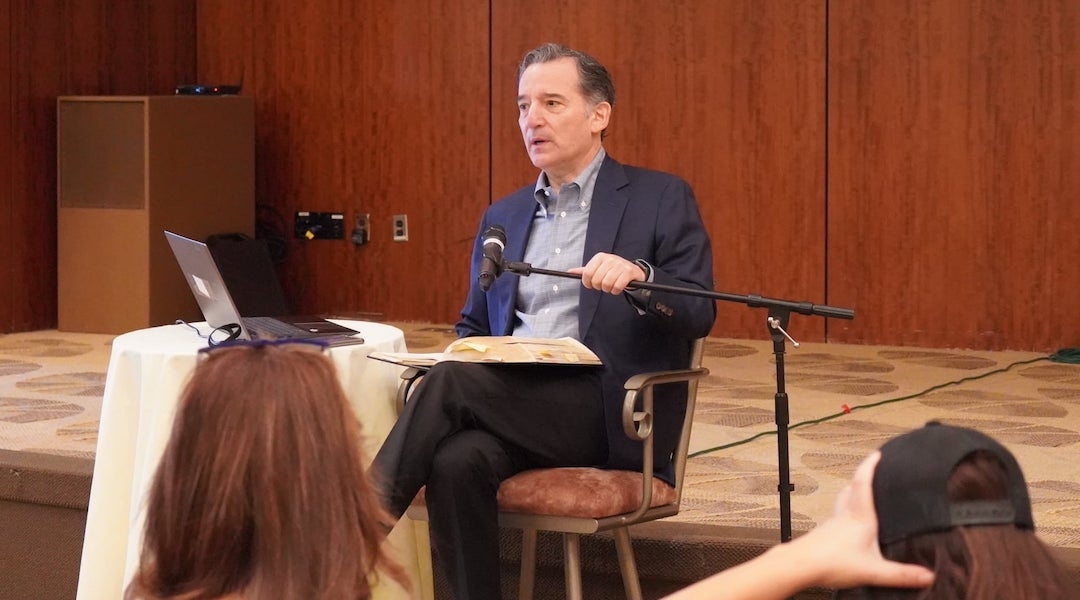Rabbi David Wolpe resigns from Harvard antisemitism committee over president’s ‘painfully inadequate testimony’ on campus antisemitism
Wolpe, who is a visiting scholar at Harvard Divinity School, has built a reputation as one of the country’s most prominent rabbis and Jewish thinkers

After serving as senior rabbi of Sinai Temple in Los Angeles for over 25 years, Rabbi David Wolpe stepped down Friday, June 30, 2023 to become emeritus rabbi. (Courtesy Sinai Temple)
(JTA) — Rabbi David Wolpe is stepping down from the antisemitism advisory committee at Harvard University, citing “events on campus and the painfully inadequate testimony” of the university’s president, Claudine Gay, during a congressional hearing this week on campus antisemitism.
“Without rehashing all of the obvious reasons that have been endlessly adumbrated online, and with great respect for the members of the committee, the short explanation is that both events on campus and the painfully inadequate testimony reinforced the idea that I cannot make the sort of difference I had hoped,” Wolpe wrote Thursday on X, formerly Twitter.
Wolpe, who is a visiting scholar at Harvard Divinity School and a rabbinic advisor to the Anti-Defamation League, has built a reputation as one of the country’s most prominent and sought-after rabbis and Jewish thinkers. He recently left his pulpit at Los Angeles’ Conservative Sinai Temple, where he is now an emeritus after more than two decades as senior rabbi, and is the author of eight books.
His exit from the committee is a blow to Harvard’s signature effort to fight antisemitism on campus in the wake of Hamas’ Oct. 7 attack on Israel. Harvard’s administration announced the advisory committee after facing backlash for what critics called an insufficient response to a student group statement that blamed the Oct. 7 attack on Israel. Upon announcing the committee at a Shabbat dinner, Gay said it would “educate our community so that they can recognize and confront antisemitism wherever they see it.”
Since it was announced at the beginning of November, the committee has met frequently. The Jewish Telegraphic Agency has learned that Gay did not directly consult the committee about the congressional hearing before it took place. Her testimony drew intense criticism when she appeared to equivocate in defining antisemitic speech.
In a statement to JTA, Gay said she appreciated Wolpe’s input and added, “Antisemitism has no place in the Harvard community, and I am committed to ensuring no member of our Jewish community faces this hate in any form.”
After a wave of criticism, Gay released a statement on Wednesday saying that Harvard students would face consequences if they called for genocide.
“There are some who have confused a right to free expression with the idea that Harvard will condone calls for violence against Jewish students,” Gay said. “Let me be clear: Calls for violence or genocide against the Jewish community, or any religious or ethnic group are vile, they have no place at Harvard, and those who threaten our Jewish students will be held to account.”
In his thread of posts on X, Wolpe said he considered Gay to be “both a kind and thoughtful person,” and that most Harvard students “wish only to get an education and a job, not prosecute ideological agendas.”
But he added that many students believe in what he called an “evil” ideology that fuels hatred of Jews.
“However, the system at Harvard along with the ideology that grips far too many of the students and faculty, the ideology that works only along axes of oppression and places Jews as oppressors and therefore intrinsically evil, is itself evil,” he wrote. “Ignoring Jewish suffering is evil. Belittling or denying the Jewish experience, including unspeakable atrocities, is a vast and continuing catastrophe. Denying Israel the self-determination as a Jewish nation accorded unthinkingly to others is endemic, and evil.”
This article originally appeared on JTA.org.















